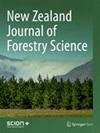Trends in discount rates used for forest valuation in New Zealand
IF 1.1
4区 农林科学
Q2 FORESTRY
引用次数: 3
Abstract
Background: The discount rate is a key input for estimating the market value of a forest. Data collected in surveys of forest valuers from 1997 to 2017 indicate a reduction in implied discount rate (IDR) over time with lower IDRs for larger forests. The purpose of this study was to formally analyse these trends. Methods: There are three steps to the analysis:1. Relationships were developed for the IDR data from 1997 to 2017;2. Further relationships were developed for IDR data from 2009 to 2017 for which forest size (i.e. net stocked area) rather than just size class is available; and3. Detailed forest transaction data from 2011 to 2017 were used to develop a model to estimate average crop value from key variables including discount rate. This process allowed an analysis to confirm whether or not trends in discount rate with time and forest size were significant. Results: Analysis of the implied discount rate (IDR) revealed that the reduction over time is significant and that the discount rate for large forests (>10,000 ha) has declined more than for smaller forests. Analysis of data from 2009, for which forest size rather than size class is available, showed that forest area has a significant effect on IDR. Finally, the discount rate within the crop-value model, developed using transaction data collected since 2011, was found to vary with time and forest size; i.e. discount rate decreased as time or forest size increased. Conclusions: Overall, it can be concluded that the discount rates implicit in New Zealand forest transactions have declined over time, with the scale of the reduction depending on forest size.新西兰用于森林估价的贴现率趋势
背景:贴现率是估算森林市场价值的关键因素。1997年至2017年森林估价师调查收集的数据表明,随着时间的推移,隐含贴现率(IDR)有所下降,较大森林的隐含贴现率较低。本研究的目的是正式分析这些趋势。方法:分析分为三个步骤:1。为1997年至2017年的IDR数据建立了关系;2.为2009年至2017年的IDR数据开发了进一步的关系,其中森林规模(即净蓄积面积)而不仅仅是规模类别是可用的;3.2011年至2017年的详细森林交易数据用于开发一个模型,根据包括贴现率在内的关键变量估计平均作物价值。这一过程使分析能够确认贴现率随时间和森林面积的变化趋势是否显著。结果:对隐含贴现率的分析表明,随着时间的推移,贴现率的下降是显著的,大型森林(>10000公顷)的贴现率下降幅度大于小型森林。对2009年的数据进行的分析表明,森林面积对IDR有显著影响。最后,使用2011年以来收集的交易数据开发的作物价值模型中的贴现率随时间和森林面积的变化而变化;即贴现率随着时间或森林规模的增加而降低。结论:总体而言,可以得出结论,新西兰森林交易隐含的贴现率随着时间的推移而下降,下降的规模取决于森林面积。
本文章由计算机程序翻译,如有差异,请以英文原文为准。
求助全文
约1分钟内获得全文
求助全文
来源期刊

New Zealand Journal of Forestry Science
FORESTRY-
CiteScore
2.20
自引率
13.30%
发文量
20
审稿时长
39 weeks
期刊介绍:
The New Zealand Journal of Forestry Science is an international journal covering the breadth of forestry science. Planted forests are a particular focus but manuscripts on a wide range of forestry topics will also be considered. The journal''s scope covers forestry species, which are those capable of reaching at least five metres in height at maturity in the place they are located, but not grown or managed primarily for fruit or nut production.
 求助内容:
求助内容: 应助结果提醒方式:
应助结果提醒方式:


